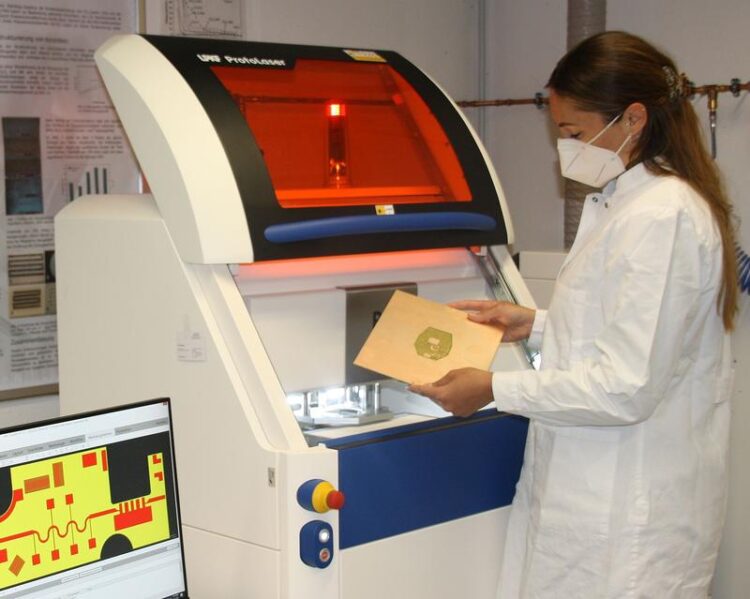Materials research using ultra-short pulse laser source

Ultra-fine structuring of a printed circuit board.
Photo: C. Wißler
University of Bayreuth has large-scale device at its disposal.
The engineering sciences at the University of Bayreuth recently acquired a unique laser device equipped with an ultra-short pulse laser source for material processing. In the fields of gas sensor technology, high-frequency technology, and microsystems technology, the device opens up unimagined research possibilities. It can structure layers and coatings on sensitive surfaces with great precision. Hardened or fired technical substrates of all kinds can be precisely cut or milled. The device costed almost € 400,000. The German Research Foundation (DFG) provided 50 per cent of the funding for the purchase of the device at the Functional Materials research group.
The new device is able to generate ultra-short laser pulses that last 1.5 picoseconds – not much longer than a trillionth of a second. As a result, almost no heat transfer occurs during material processing with this laser: The material hit by the laser beam with utmost accuracy evaporates immediately. Consequently, it is all the easier to structure and engrave surfaces at the micrometer level in a controlled manner without damaging adjacent areas. Other examples are the removal of transparent and extremely thin layers from the substrate, or the detachment of metal from plastics. In addition, precise cutting and milling of ceramic materials, for example aluminium oxide, is also possible.
“The new laser processing system is invaluable for the research and development of innovative functional materials, for example of highly sensitive sensors or ultra-fine structured printed circuit boards. On the campus of the University of Bayreuth, it will be accessible to all natural and technical sciences research areas, as well as to external research partners. The device will also enable young scientists from and outside of the University of Bayreuth to work on research topics for which the necessary infrastructure is lacking at many other university locations,” says Prof. Dr.-Ing. Ralf Moos, Chair of Functional Materials. “Even our previous device brought us repeated enquiries over recent years, that were the starting point for very interesting research work. I am sure that we will receive just as many requests for our new laser processing system, and get involved in exciting new challenges,” says Dr.-Ing. Jaroslaw Kita, who supervises the device at Functional Materials.
Wissenschaftliche Ansprechpartner:
Prof. Dr.-Ing. Ralf Moos / Dr.-Ing. Jaroslaw Kita
Functional Materials
University of Bayreuth
Phone: +49 (921) 55-7400 / 55-7407
E-mail: funktionsmaterialien@uni-bayreuth.de
Media Contact
All latest news from the category: Materials Sciences
Materials management deals with the research, development, manufacturing and processing of raw and industrial materials. Key aspects here are biological and medical issues, which play an increasingly important role in this field.
innovations-report offers in-depth articles related to the development and application of materials and the structure and properties of new materials.
Newest articles
Faster, more energy-efficient way to manufacture an industrially important chemical
Zirconium combined with silicon nitride enhances the conversion of propane — present in natural gas — needed to create in-demand plastic, polypropylene. Polypropylene is a common type of plastic found…

Energy planning in Ghana as a role model for the world
Improving the resilience of energy systems in the Global South. What criteria should we use to better plan for resilient energy systems? How do socio-economic, technical and climate change related…

Artificial blood vessels could improve heart bypass outcomes
Artificial blood vessels could improve heart bypass outcomes. 3D-printed blood vessels, which closely mimic the properties of human veins, could transform the treatment of cardiovascular diseases. Strong, flexible, gel-like tubes…





















